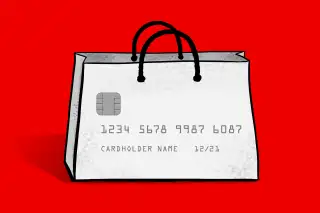What Are Store Credit Cards and When Are They a Good Deal?

It's an annual tradition. You're shopping for the holidays, and just as you're checking out, you're asked if you'd like to save money on today's purchases by applying for a store credit card. In 2020, this offer is more likely to come as a pop-up on your screen than as a question from a cashier, but the question is no less important.
What is a store credit card?
A store credit card is a revolving charge account that's branded, or co-branded with a retailer. Some store credit cards can only be used for in-store purchases, including online purchases from the retailer. These are often called store charge cards and they're very commonly offered by small and medium sized retailers.
Alternatively, many large retailers offer store credit cards that are part of larger payment network such as Visa, Mastercard or American Express. And while these cards will typically offer store-specific rewards and benefits, they can be used for purchases at any merchant that is part of the payment network shown on the card.
What are the benefits of a store credit card?
First, a store credit card will typically offer new applicants a modest discount on their purchases that day. If your making a very expensive purchase, then your savings could be significant. But if you're making a smaller purchases, then your discount may not add up to much.
Next, store credit cards don't usually require an excellent or a good credit score, or even much of a credit history, if any. That makes store credit cards attractive for those who are new to credit or those who have had serious credit problems in the past. Opening a store credit card, using it for a few purchases and paying your balance in full is a very traditional way to establish or re-establish good credit.
Finally, a store credit card will often provide store specific rewards and benefits. For example, the Target RedCard offers you 5% cash back at Target.com, including pickup & delivery, and you have an additional 30 days to return purchases made with your Target RedCard. Most retailers also send store cardholders exclusive promotions and coupons.
What are the disadvantages of a store credit card?
Store credit cards have their uses, but they also can have significant drawbacks. First of all, a store card will often have very high interest rates. It's not uncommon for a store charge card to have a standard interest rate of nearly 30% APR, which is approximately double the national average.
Store credit cards may also offer inferior rewards. While you'll usually receive the most valuable rewards when you use your card at the store that offers it, it will rarely offer completive rewards for non-store purchases. That's because most store cards will only offer 1% cash back for out-of-store purchases, while other cards offer more.
But also, having a store credit card in your wallet can serve as an advertisement for the store, and tempt you to make purchases there that might not represent the best deals. People will often shop at the store they have a card from, rather than shop around for lower prices or look for second hand merchandise.
Shoppers may also spend less time considering a store card's terms and conditions when presented with an application just before they are completing a purchase. Viewing an on-screen pop-up or standing in front of a cash register aren't often the best times to be making important financial decisions like applying for a credit card.
Bottom line
Store credit cards can be attractive, but it only makes sense to get one if you're a huge fan of the store, and are confident that you'll be spending a lot of money there. By understanding all of the benefits and drawbacks of store cards, you can make the right decision for your needs.
More from Money:
Best Cash Back Credit Cards of 2020